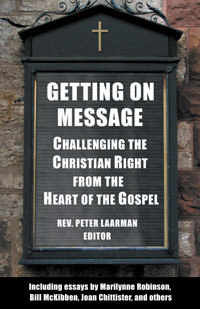Book Review: Getting on Message
Challenging the Christian Right from the Heart of the Gospel by Rev. Peter Laarman
by Claire Gorfinkel for JewsOnFirst.org, May 4, 2006
Rev. Peter Laarman, Editor
Getting on Message
Challenging the Christian Right from the Heart of the Gospel
232 Pages, Beacon Press, $15
 As American Jews, the notion that "we live in a Christian country" is filled with complexity and irony. Christianity
pervades our lives like the air we breathe, and some times - particularly Christmas and Easter times - we can't
avoid being overwhelmed by the blurring of Christianity with mainstream commercialism. For example, I recall
spending a Thanksgiving in Hawai`i, where the dominant culture is Polynesian and Asian, but the Honolulu airport
was filled with Christmas trees and the public address system was blasting "Chestnuts Roasting on an Open Fire."
I couldn't help wondering whether I was the only one who found this discordant on a whole series of levels.
As American Jews, the notion that "we live in a Christian country" is filled with complexity and irony. Christianity
pervades our lives like the air we breathe, and some times - particularly Christmas and Easter times - we can't
avoid being overwhelmed by the blurring of Christianity with mainstream commercialism. For example, I recall
spending a Thanksgiving in Hawai`i, where the dominant culture is Polynesian and Asian, but the Honolulu airport
was filled with Christmas trees and the public address system was blasting "Chestnuts Roasting on an Open Fire."
I couldn't help wondering whether I was the only one who found this discordant on a whole series of levels.
But in the 21st Century, with the Christian Right appropriating our text while seeking our conversion and relishing our destruction in the Armageddon that they welcome, it is no longer sufficient to duck out of town (or go to a Chinese restaurant) during their holidays. We are called upon to be more vigilant, for ourselves and for others who are victimized by their pervasive, self-righteous, authoritarian, militaristic acquisitiveness and their demonization of poor people, immigrants, gays and lesbians, women, liberals, and everyone else who does not identify as "born again."
Thus it is with great hope and pleasure that we may turn to Getting on Message; Challenging the Christian Right from the Heart of the Gospel edited by Rev. Peter Laarman. Here, we Jews who care for the First Amendment - and presumably the expansion of economic justice and human rights - can discover our counterparts in opposition to an increasingly Christianized right-wing country.
There is much to love in this book. These authors are blunt in naming the destruction brought on by right-wing Christianity during the past few decades. Marilynne Robinson's brilliant critique of the "anti-Darwinists" gives us strong language with which to respond to their rejection of science. I particularly welcomed the essays that spoke from the heart, from personal experience. Rev. Vivian Denise Nixon passionately depicts the prison-industrial complex. Rev. James Lawson enables us to experience his first-hand encounters with racism. Rev. Rick Ufford-Chase vividly portrays economic injustice where the first world meets the "two-thirds" world at the Mexico/US border. Rev. Chloe Breyer beautifully honors women's capacity for moral discernment, and Rev. Bill Sinkford clearly defends the right of marriage for everyone. I am grateful that Rev. Alexia Salvatierra challenges her readers to honor those who work by guaranteeing them a living wage, health care and humane working conditions. After all, they too were once slaves in Egypt.
Here lies the dilemma of the book for me. One of my favorite rabbis laments the fact that while his Christian counterparts frequently cite our Torah, prophets, psalms and writings in their sermons and teachings, to enthusiastic response from their congregants, the reverse is not also true. Given our experience of persecution, he and his rabbinic colleagues cannot publicly explore the possibility that the Christian gospels might offer insights or teachings relevant to Jews. Each of the fourteen essays in this volume begins with a short quote: half come from Hebrew Bible and half from the Christian Gospels. They speak about us, but we are not included in the discussion.
So we are, once again, marginalized. The authors are speaking as Christians to Christians and we understand why because they have told us: there is so terribly much work for them to do, for progressive Christians to stand up, to challenge their right-wing counterparts and reach out to the mainstream, the disaffected and the questioning in their communities. As Rev. Laarman, editor of the book and Executive Director of Progressive Christians Uniting (PCU) notes, their goal is "to take the Bible back from the blinkered Biblicists and reemphasize the scriptural primacy of justice and mercy." (See www.progressivechristiansuniting.org) It is an important task and one which we should applaud.
Finally, then, for those of us who seek to build bridges across and among faith traditions, this book is a great
resource. We are still a far cry from using the Christian Gospel in our Jewish congregations, but the next time
we feel the need to speak out against the Christian Right, here are some of articulate, brave and committed clergy
and lay people whom we can call upon to join with us.
Claire Gorfinkel is a writer and social change activist, with a particular interest in building bridges of understanding between members of different faith traditions. Her publishing company, Intentional Productions, focuses on "stories of courage ... human responses to adversity and evil." See www.intentionalproductions.com .